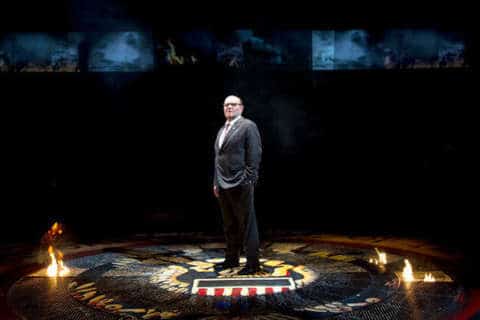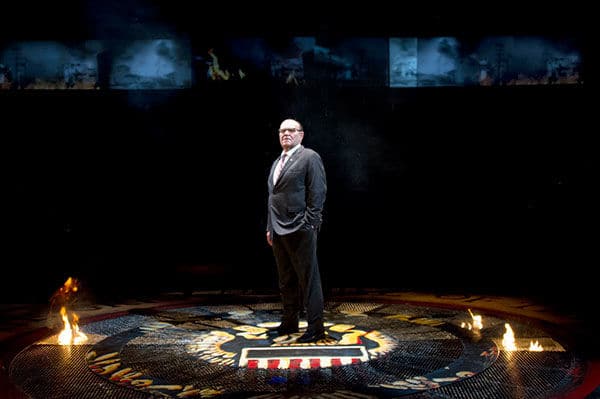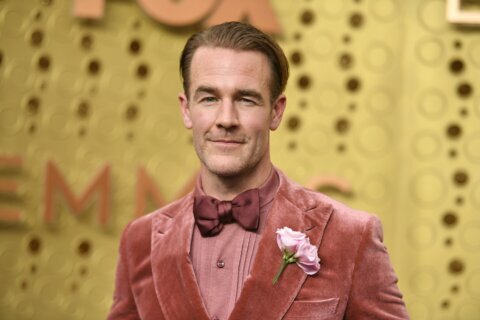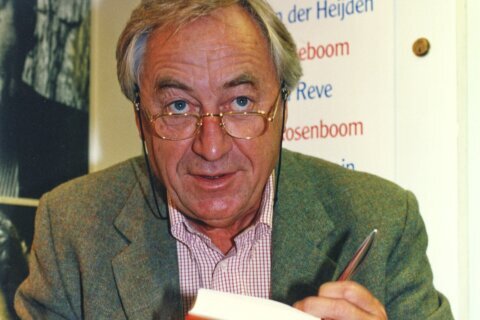WASHINGTON — In 2014, the Lyndon B. Johnson play “All the Way” won Tonys for Best Play (playwright Robert Schenkkan) and Best Actor (Bryan Cranston, who reprised it on HBO).

This President’s Day, its sequel, “The Great Society,” arrives at Arena Stage (Feb. 2-March 11).
“‘The Great Society’ follows his second term [on] the heels of his historic landslide victory over Barry Goldwater, which gives him control of both houses of Congress, culminating four years later in his shocking announcement that he will not run again for office,” Schenkkan said.
While “All the Way” dealt with LBJ’s first term, assuming the presidency after John F. Kennedy’s assassination and passing the Civil Rights Act of 1964, “The Great Society” shows his domestic agenda overshadowed by Vietnam, straining his relationship with Dr. Martin Luther King Jr.
“If you think about this in classical theater terms, ‘All the Way’ is a drama and ‘The Great Society’ is a tragedy,” Schenkkan said. “This individual who unarguably does so much good domestically — Medicare, Medicaid, education, clean air, clean water, three historic civil rights bills … just a profound shifting of the society — [but] then, Vietnam. He knew at the time that his foreign policy was going to doom his domestic policy, yet he continued to march forward.”
The sequel features the same cast, including Jack Willis as LBJ and Bowman Wright as MLK.
“It’s such a great ensemble of actors,” Schenkkan said. “They’re such extraordinarily talented individuals. The challenge is that they’re in demand as a consequence, so you hope you can get them all back, knowing that’s a long reach. In our case, we were extraordinarily fortunate that everybody really wanted to be back. … [Willis] is giving the performance of a lifetime.”
Likewise, the play is the culmination of a lifetime of experiences for Schenkkan.
Growing up in Austin, Texas, his mother was an actress and his father was a playwright, who actually crossed paths with Lyndon B. Johnson during his early political days as a senator.
“My dad was a pioneer in public television/radio hired [by] the University of Texas at Austin to create the first public radio/television station in the Southwest,” he said. “Job No. 1 was to go to then-Senator Johnson and get his permission, because [it] would’ve been in direct conflict with Lady Bird’s media empire. I’m pleased to say he not only gave his permission, but as president, would sign into law the bill that created the Corporation for Public Broadcasting.”
Schenkkan remembers loving LBJ as a kid and then criticizing him during the Vietnam War.
“My parents were liberal democrats, supportive of integration, and I remember that election, 1964, LBJ/Goldwater, how it just felt Manichean, the forces of light against the forces of dark, and how thrilled we were with his landslide,” Schenkkan said. “Then, just a year and a half later, with troop levels in Vietnam ramping up from 23,000 to 170,000 and my oldest brother facing the draft, I had a very different feeling about LBJ. That’s where I got off the LBJ ship.”
His view began to shift again as a father, when he began re-examining LBJ’s domestic legacy.
“I became aware of the domestic programs he created, which were extremely helpful to me and people like me, and I thought differently about him again,” Schenkkan said. “So, he’s always been in my head as this really interesting, truly Shakespearean character, not only big physically — 6-foot-4, 250 pounds — but big emotionally, big in his appetites, big in his virtues and vices, a Shakespearean character and someone who, to me, belonged on the stage.”
And so, 20 years after winning the Pulitzer Prize for Drama with “The Kentucky Cycle” (1992), Schenkkan was commissioned by the Oregon Shakespeare Festival to write “All the Way.”
“Jack Kennedy is assassinated in Dallas and Lyndon B. Johnson suddenly becomes president,” he said. “To liberal democrats, he’s a liberal. To southern ‘Dixiecrats,’ he’s a good old boy. But what does he really believe? To everyone’s surprise, it turns out what [he] really believes in is civil rights. … He succeeds, but already, the seeds of the looming crisis have been planted.”
Those seeds blossom into Johnson’s tragic downfall portrayed in “The Great Society.”
“I would’ve been very disappointed if I had never been able to write ‘Part 2’ of this story,” he said. “Fortunately, as I was writing ‘All the Way,’ I was commissioned by the Seattle Repertory Theatre to write ‘The Great Society.’ When we won the Tony Award, the next day, I and my director, Bill Rouch, were flying back from New York City to Ashland, Oregon, going over our notes for a ‘Great Society’ run-through to be held that week. That’s how tight things were.”
While the sequel focuses mostly on LBJ, it also explores an ensemble of other pivotal figures.
“There are such amazing people in this story,” Schenkkan said. “King comes out against the Vietnam War, is demonized across the country [and] assassinated in Memphis. Bobby Kennedy, who finds himself after wandering in the political desert, seems in place to take the Democratic nomination, and he, too, is assassinated. On the right, you have the shocking rise of Richard Nixon out of the ashcan of political history and he, of course, is elected twice to president. Then, in the south, George Wallace. It’s an extraordinary collection of individuals.”
These aren’t mere ghosts from yesteryear. They are historical lessons that continue today.
“History is not something that just exists in the past; it lives through us continuously. We are continuously informed by and moved by [it],” Schenkkan said. “If you’re going to understand where we are today politically, you really need to understand LBJ. There are people who say that we live in the world that LBJ created … and I think there’s actually some truth to that.”
Click here for more on “The Great Society.” Listen to our full chat with Robert Schenkkan below:









